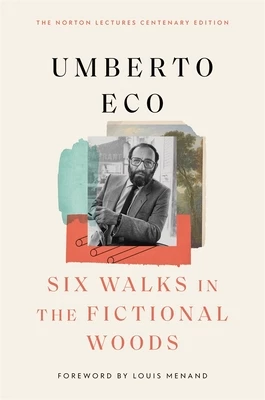Six Walks in the Fictional Woods
28,21 €
33,19 €
"Erudite, wide-ranging, and slyly humorous."--The Atlantic One of the great novelists and public intellectuals of our time gives a master class on the philosophy of fiction. Umberto Eco was fond of pointing out that all writing is narrative. He published his famed debut novel The Name of the Rose when he was forty-eight years old, yet he believed that everything he had written to that point--from treatises on semiotics to essays on mass culture--took the form of a story. To Eco, scholarship, mu…
Autorius:
Umberto Eco
Leidėjas:
Belknap Press
ISBN-10: 067430246X
ISBN-13:
9780674302464
Formatas: 15.2 x 22.4 x 2 cm, kieti viršeliai
Kalba:
Anglų
Six Walks in the Fictional Woods
(el. knyga)
(skaityta knyga)
| knygos.lt
Atsiliepimai
(4.15 Goodreads įvertinimas)
Aprašymas
"Erudite, wide-ranging, and slyly humorous." --The Atlantic
One of the great novelists and public intellectuals of our time gives a master class on the philosophy of fiction .
Umberto Eco was fond of pointing out that all writing is narrative. He published his famed debut novel
The Name of the Rose when he was forty-eight years old, yet he believed that everything he had written to that point--from treatises on semiotics to essays on mass culture--took the form of a story. To Eco, scholarship, much like fiction, was shaped by narrative. It was the stuff of life itself.
Six Walks in the Fictional Woods, a collection of essays based on Eco's 1992-1993 Norton Lectures at Harvard, illuminates fiction's porous boundaries--in particular, the myriad ways that literary works conscript readers' experiences and expectations. Fiction, says Eco, can offer metaphysical comfort by appealing to our desire for a smaller, more legible world, one that gives a definitive answer to the question of "whodunnit?" But it also makes demands of us, presupposing a model reader who possesses the cultural knowledge necessary to interpret the text, as well as a willingness to follow the never-quite-specified rules of the literary game.
Whether he is dissecting grammatical ambiguities in Gérard de Nerval's nineteenth-century romantic masterpiece
Sylvie, studying the rhythms of Ian Fleming's James Bond novels, or tracing the web of fraud and misattribution that produced the antisemitic conspiracy theory of
The Protocols of the Elders of Zion, this is Eco at his very best: intellectually omnivorous, endlessly fascinated by hoaxes, and always an adept navigator of the narrative forests that surround us.
28,21 €
33,19 €
Išsiųsime per 12–18 d.d.
4d. 13: 31: 07
Nuolaidos kodas galioja perkant nuo 10 €. Nuolaidos nesumuojamos.
Autorius:
Umberto Eco
Leidėjas:
Belknap Press
ISBN-10:
067430246X
ISBN-13:
9780674302464
Formatas: 15.2 x 22.4 x 2 cm, kieti viršeliai
Kalba:
Anglų
Anglų
"Erudite, wide-ranging, and slyly humorous." --The Atlantic
One of the great novelists and public intellectuals of our time gives a master class on the philosophy of fiction .
Umberto Eco was fond of pointing out that all writing is narrative. He published his famed debut novel
The Name of the Rose when he was forty-eight years old, yet he believed that everything he had written to that point--from treatises on semiotics to essays on mass culture--took the form of a story. To Eco, scholarship, much like fiction, was shaped by narrative. It was the stuff of life itself.
Six Walks in the Fictional Woods, a collection of essays based on Eco's 1992-1993 Norton Lectures at Harvard, illuminates fiction's porous boundaries--in particular, the myriad ways that literary works conscript readers' experiences and expectations. Fiction, says Eco, can offer metaphysical comfort by appealing to our desire for a smaller, more legible world, one that gives a definitive answer to the question of "whodunnit?" But it also makes demands of us, presupposing a model reader who possesses the cultural knowledge necessary to interpret the text, as well as a willingness to follow the never-quite-specified rules of the literary game.
Whether he is dissecting grammatical ambiguities in Gérard de Nerval's nineteenth-century romantic masterpiece
Sylvie, studying the rhythms of Ian Fleming's James Bond novels, or tracing the web of fraud and misattribution that produced the antisemitic conspiracy theory of
The Protocols of the Elders of Zion, this is Eco at his very best: intellectually omnivorous, endlessly fascinated by hoaxes, and always an adept navigator of the narrative forests that surround us.
DĖMESIO!
Tai yra elektroninė knyga, skirta skaityti el. knygų skaityklėse, telefonuose, planšetėse ar kompiuteriuose.
Svarbu! Nėra galimybės siųstis el. knygų jungiantis iš Jungtinės Karalystės.
Daugiau informacijos apie el. knygas čia
DĖMESIO!
Tai knyga, kurią parduoda privatus žmogus. Kai apmokėsite užsakymą, jį per 7 d. išsiųs knygos pardavėjas
Šios knygos būklė nėra įvertinta knygos.lt ekspertų, todėl visa atsakomybė už nurodytą knygos kokybę priklauso pardavėjui.
Norite ir jūs parduoti skaitytas knygas ir užsidirbti?Sužinokite daugiau čia
Perskaityta knyga:
Nenauja knyga, kuri parduodama tiesiai iš knygos.lt sandėlio. Knygos kokybė įvertinta knygos.lt ekspertų.
Sveikiname, Jūs laimėjote!
Kodas galioja iki:
Pasinaudokite nuolaidos kodu krepšelyje.
[{"option":"129","probability":13,"style":{"backgroundColor":"#f2f2f2"},"image":{"uri":"\/uploads\/images\/wheel_of_fortune\/691b2307abdb21763386119.png","sizeMultiplier":0.6,"landscape":true,"offsetX":-50}},{"option":"128","probability":13,"style":{"backgroundColor":"#da1e2d"},"image":{"uri":"\/uploads\/images\/wheel_of_fortune\/691b22d47f6341763386068.png","sizeMultiplier":0.6,"landscape":true,"offsetX":-50}},{"option":"127","probability":15,"style":{"backgroundColor":"#f2f2f2"},"image":{"uri":"\/uploads\/images\/wheel_of_fortune\/691b22b698d6b1763386038.png","sizeMultiplier":0.6,"landscape":true,"offsetX":-50}},{"option":"126","probability":14,"style":{"backgroundColor":"#da1e2d"},"image":{"uri":"\/uploads\/images\/wheel_of_fortune\/691b229c542901763386012.png","sizeMultiplier":0.6,"landscape":true,"offsetX":-50}},{"option":"125","probability":15,"style":{"backgroundColor":"#f2f2f2"},"image":{"uri":"\/uploads\/images\/wheel_of_fortune\/691b225d36dcf1763385949.png","sizeMultiplier":0.6,"landscape":true,"offsetX":-50}},{"option":"124","probability":15,"style":{"backgroundColor":"#da1e2d"},"image":{"uri":"\/uploads\/images\/wheel_of_fortune\/691b2215aaee11763385877.png","sizeMultiplier":0.6,"landscape":true,"offsetX":-50}},{"option":"123","probability":14,"style":{"backgroundColor":"#f2f2f2"},"image":{"uri":"\/uploads\/images\/wheel_of_fortune\/691b21f0003da1763385840.png","sizeMultiplier":0.6,"landscape":true,"offsetX":-50}},{"option":"122","probability":1,"style":{"backgroundColor":"#da1e2d"},"image":{"uri":"\/uploads\/images\/wheel_of_fortune\/691b203dd14a31763385405.png","sizeMultiplier":0.6,"landscape":true,"offsetX":-50}}]

Akcija baigiasi už 4d.13:31:07



Atsiliepimai